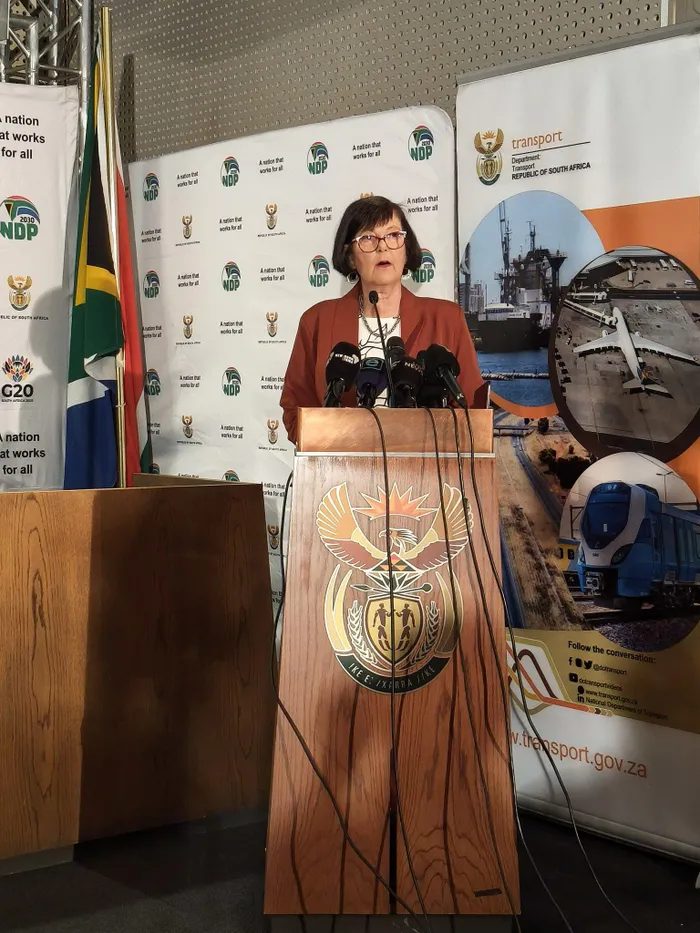
Minister of Transport Barbara Creecy has announced 11 new train operating companies to join Transnet’s network
Image: Department of Transport/ X
Business has welcomed the allocation of rail slots to 11 new train operating companies (TOCs) across 41 routes and six corridors, as announced by Minister of Transport Barbara Creecy.
Busiswe Mavuso, the CEO of Business Leadership South Africa, said it was an important step towards a competitive and thriving logistics system in South Africa.
"This is the realisation of years of intense collaboration between business and government to improve the performance of the rail network by introducing private operators and investors. When we speak of structural reform in logistics, this is what we mean – creating the competitive environment that will drive efficiency, investment and ultimately economic growth. This step is one along the plan that we have been advocating for through the National Logistics Crisis Committee," she said.
She said introducing competition was never going to be easy.
"Breaking up a monopoly requires political courage, regulatory sophistication and sustained commitment from all stakeholders. The fact that we now have 11 new entrants preparing to move 20 million additional tonnes of freight annually from 2026/27, and able to participate in funding for future growth, is testament to what can be achieved when we move beyond the tired rhetoric of public versus private and focus on solutions," Mavuso said.
Mavuso said she was particularly encouraged by the transparent, merit-based evaluation that resulted in these allocations, saying the establishment of the Interim Rail Economic Regulatory Capacity (IRERC) to manage the consultation process demonstrates the kind of institutional innovation we need across government.
However, Mavuso said the real test now lies in implementation. The conditional award letters requiring Railway Safety Regulator permits, rolling stock readiness and port capacity arrangements are essential safeguards for a system that must work safely and efficiently, but they need to be swiftly delivered.
"We cannot see reforms stall the way we have in the concessioning of the Durban Container Port, with a preferred bidder announced two years ago still not able to proceed because the award is snarled up in court," she said.
She said success in this first phase of rail reform will determine whether South Africa can attract the next wave of private investment needed to modernise its entire transport network. Mavuso said international operators and financiers are watching carefully. "They see a country finally serious about structural reform, but they also see the implementation risks that have derailed previous reform efforts," she said.
Meanwhile, the Road Freight Association (RFA) welcomed the announcement as an historic and necessary step towards a more efficient national logistics system for South Africa.
Kevin van der Merwe, acting CEO of the RFA, said, "The RFA supports this development that has the potential to optimise the capacity of Transnet through the introduction of privately owned third-party operators. This is a significant move with the potential to revitalise our rail network, reduce congestion on our roads by returning rail-friendly freight back to rail, while ultimately reducing the cost of logistics in South Africa. The Association recognises that freight movement on rail will create jobs in the rail freight sector and will necessitate partnerships with road freight operators to get freight to and from the train or multi-modal hubs."
However, the RFA cautioned that the work lying ahead is substantial.
"The Department must ensure that the regulatory environment supports these new entrants, that the existing rail infrastructure is secured, maintained and improved expediently, and that the collaboration between road and rail is seamless," Van der Merwe said.
The RFA said it will watch developments over the next 12 months with keen interest, and the expectation that the TOCs will start operating in the latter half of 2026.
"Developments such as this, have the potential to improve South Africa’s economy through employment opportunities and wealth creation for all its citizens, while positioning South Africa as an efficient, cost-effective, vibrant logistics hub, chain and developmental node for all modes of transport," it said.
BUSINESS REPORT